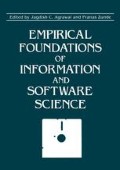Abstract
One of the most desirable features of a document retrieval system is that the items in the system’s output are ranked in descending order by their likelihood of relevance. In this way, the system’s user can be presented with a manageable set of those documents in the collection which are most likely to be useful in satisfying his information needs. However, commercially available retrieval systems are usually based on conventional set theory and Boolean logic, and thus they generally do not have sound ranking capabilities. In other words, a document retrieval system founded on a typical Boolean search strategy provides the user with a number of documents listed in an arbitrary order, i. e., no indication of document relevance is offered. Since in operational situations such unranked output is often very large, especially when the query is a broad one, a great burden may be imposed on the user
The objective ofthis paper is to discuss the results of the author’s recent investigation into rigorous methods for incorporating a weighting mechanism into conventional Boolean retrieval systems in order to provide lists of ranked output documents. This has been achieved by developing a formal theory linking Boolean retrieval procedures applicable in the case of queries as well as documents represented by simply by sets of unweighted index terms. Implementation of the resulting document ranking achemes would not require any changes in the principles upon which operational Boolean retrieval systems are based; some additional software is all that would be needed. This indicates the great potential of these ranking schemes for significantly improving the effectiveness of conventional document retrieval systems.
Access this chapter
Tax calculation will be finalised at checkout
Purchases are for personal use only
Preview
Unable to display preview. Download preview PDF.
References
B.H Arnold,Logic and Boolean Algebra, Prentice-Hall, Englewood Cliffs, New Jersey, 1962.
T. Radecki, A model of a document-clustering-based information retrieval system with a boolean search request formulation,Information Retrieval Research, R. N. Oddy et al., eds., Butterworths, London, 1981, pp. 334 – 344
T. Radecki, Reducing the perils of merging boolean and weighted retrieval systems,Journal of Documentation, 1982, 38 (3), pp. 207 – 211
T. Radecki, Similarity measures for boolean search request formulations,Journal of the American Society for Information Science, 1982,33(1), pp. 8 – 17
T. Radecki, On a probabilistic approach to determining the similarity between boolean search request formulations,Journal of Documentation, 1982,38(1), pp. 14 – 28
T. Radecki, Incorporation of relevance feedback into boolean retrieval systems,Research and Development in Information Retrieval, G. Salton and J. J. Schneider, eds., Springer-Verlag, Berlin, 1983, pp. 133 – 150
SE Robertson, K. Sparck Jones, Relevance weighting of search terms,Journal of the American Society for Information Science, 1976,27(3), pp. 129 – 146
C.J. Van Rijsbergen,Information Retrieval, 2nd Ed., Butterworths, London, 1979
W.S. Cooper and P. Huizinga, The maximum entropy principle and its application to the design of probabilistic retrieval systems,Information Technology: Research and Development, 1982,1(2), pp. 99 – 112
M.H. Heine, A simple, intelligent front end for information retrieval systems using boolean logic,Information Technology: Research and Development, 1982,1(4), pp. 247 – 260
W.S. Cooper, Exploiting the maximum entropy principle to increase retrieval effectiveness,Journal of the American Society for Information Science, 1983,34(1), pp. 31 – 39
Author information
Authors and Affiliations
Editor information
Editors and Affiliations
Rights and permissions
Copyright information
© 1985 Springer-Verlag US
About this chapter
Cite this chapter
Radecki, T. (1985). Document Ranking Methodology for Conventional Boolean Retrieval Systems. In: Agrawal, J.C., Zunde, P. (eds) Empirical Foundations of Information and Software Science. Springer, Boston, MA. https://doi.org/10.1007/978-1-4613-2521-5_22
Download citation
DOI: https://doi.org/10.1007/978-1-4613-2521-5_22
Publisher Name: Springer, Boston, MA
Print ISBN: 978-1-4612-9523-5
Online ISBN: 978-1-4613-2521-5
eBook Packages: Springer Book Archive

